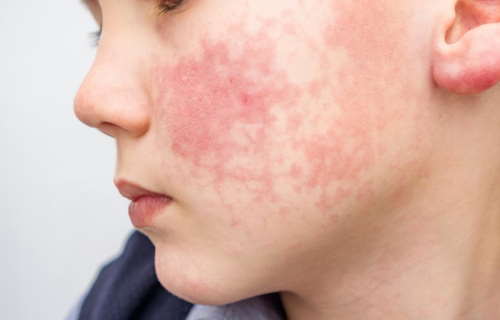In humans, the symptoms of monkeypox are similar to but milder than the symptoms of smallpox. Monkeypox begins with fever, headache, muscle aches, and exhaustion. The main difference between symptoms of smallpox and monkeypox is that monkeypox causes lymph nodes to swell (lymphadenopathy) while smallpox does not. The incubation period (time from infection to symptoms) for monkeypox is usually 7−14 days but can range from 5−21 days.
Since it has such a long incubation period, that would make it an ideal candidate for a global pandemic if it mutates into a form that can spread easily among humans.
Monkeypox is a disease that I have been monitoring for quite a while now. It is not supposed to spread easily from human to human, and hopefully that is still true. But human cases are now popping up in the UK, and authorities are not exactly sure how it is spreading. As we have seen with COVID, deadly diseases can mutate in dangerous and unpredictable ways. And as we have also seen, a handful of human cases can ultimately turn into a worldwide pandemic. So we should definitely keep an eye on this alarming new outbreak in the UK, because it could potentially become something much larger.
Monkeypox is a rare disease caused by the monkeypox virus. It leads to rash and flu-like symptoms. Like the better known virus that causes smallpox, it is classified as an orthopoxvirus. Monkeypox was discovered in 1958 when two outbreaks of a pox-like disease occurred in groups of monkeys being used for research.
What is monkeypox?
Monkeypox is caused by a virus that is a relative of smallpox. As the name suggests, it was first identified in monkeys, and is mainly confined to West and Central Africa.
Why is it in the news?
On 7 May, the UK Health Security Agency (UKHSA) announced that someone had contracted monkeypox after recently travelling to Nigeria. The individual developed a rash on 29 April and returned to the UK on 4 May, when they were hospitalised. Two days later, a laboratory test confirmed that the individual had the monkeypox virus. Contact tracing began on 11 May, with no contacts reporting monkeypox symptoms to date.
One week later, the UKHSA announced that two other people, not related to the case announced on 7 May, had been diagnosed with the monkeypox virus. These individuals live together, with one requiring hospital care and the other isolating.
Monkeypox was first reported in the UK in 2018. Seven cases have since been identified, all related to travelling to or from Nigeria.
What are the symptoms?
Monkeypox is usually mild, with most people recovering without treatment within 14 to 21 days. Initial symptoms can include fever, headache, muscle aches, backache, swollen lymph nodes, chills and exhaustion.
A chickenpox-like rash can develop, often beginning on the face, before spreading, particularly to the hands and feet. The rash goes through several stages, developing into papules and fluid-filled pustules, before eventually forming a scab that falls off.
How serious is the disease?
Monkeypox is usually mild, however, it has a reported death rate of between 1 per cent and 10 per cent, with children being most likely to die.
How does monkeypox spread?
Monkeypox can be caught from infected wild animals in parts of West and Central Africa. This may occur if you are bitten or if you touch the animal’s blood, fluids, spots, blisters or scabs. Monkeypox may also be transmitted by eating the undercooked meat of an infected animal.
The virus doesn’t pass very easily between people, however, transmission can occur via contact with bodily fluids, blisters or scabs, or getting close enough to breathe in large airborne droplets. These droplets generally can’t travel more than 1 metre or so, according to the US Centers for Disease Control and Prevention. Touching clothing, bedding or towels used by someone with monkeypox may also be a risk.
Speaking of the latest two cases, Colin Brown at UKHSA said in a statement: “While investigations remain ongoing to determine the source of infection, it is important to emphasise it [monkeypox] does not spread easily between people and requires close personal contact with an infected symptomatic person.
“The overall risk to the general public remains very low.”
Is monkeypox curable?
There’s currently no proven, safe treatment available for monkeypox. Antiviral drugs may help, but they haven’t been studied as a treatment for monkeypox. Instead, your healthcare provider will monitor your condition and try to relieve your symptoms. Most people get better on their own without treatment. If there is an outbreak of monkeypox in multiple people, the Center for Disease Control (CDC) has options to control the spread of the disease using the smallpox vaccine and other treatments.
What is The Lost Book of Remedies? The Lost Book of Remedies PDF contains a series of medicinal and herbal recipes to make home made remedies from medicinal plants and herbs. Chromic diseases and maladies can be overcome by taking the remedies outlined in this book. The writer claims that his grandfather was taught herbalism and healing whilst in active service during world war two and that he has treated many soldiers with his home made cures.
How do you prevent monkeypox virus?
A smallpox vaccine can provide protection against monkeypox, but its use is currently limited to people who work in a lab with the variola (smallpox) virus. Prevention depends on decreasing human contact with infected animals and limiting person-to-person spread. You can prevent monkeypox virus by:
Avoiding contact with infected animals (especially sick or dead animals).
Avoiding contact with bedding and other materials contaminated with the virus.
Washing your hands with soap and water after coming into contact with an infected animal.
Thoroughly cooking all foods that contain animal meat or parts.
Avoiding contact with people who may be infected with the virus.
Using personal protective equipment (PPE) when caring for people infected with the virus.
How long does monkeypox last?
Monkeypox normally takes about two to four weeks to run its course. If you are exposed to monkeypox, your provider will monitor you for 21 days.
How is monkeypox diagnosed?
Because monkeypox is so rare, your healthcare provider may first suspect other rash illnesses, such as measles, chickenpox or even smallpox. However, swollen lymph nodes distinguish monkeypox from other poxes.
To diagnose monkeypox, your healthcare provider takes a tissue sample that is looked at using a microscope. You may also need to give a blood sample to check for the monkeypox virus or antibodies your immune system makes to it.
Books can be your best pre-collapse investment.
Carnivore’s Bible (is a wellknown meat processor providing custom meat processing services locally andacross the state of Montana and more. Whether your needs are for domestic meator wild game meat processing)
The Lost Book of Remedies PDF ( contains a series of medicinal andherbal recipes to make home made remedies from medicinal plants and herbs.Chromic diseases and maladies can be overcome by taking the remediesoutlined in this book. The writer claims that his grandfather was taughtherbalism and healing whilst in active service during world war twoand that he has treated many soldiers with his home made cures. )
Easy Cellar(Info about building and managing your root cellar, plus printable plans. The book on building and using root cellars – The Complete Root Cellar Book.)
The Lost Ways (Learn the long forgotten secrets that helped our forefathers survive famines,wars,economic crisis and anything else life threw at them)
LOST WAYS 2 ( Wordof the day: Prepare! And do it the old fashion way, like our fore-fathers did it and succeed longbefore us,because what lies ahead of us will require all the help we can get. Watch this video and learn the 3 skills that ensured our ancestors survival in hard times offamine and war.)



